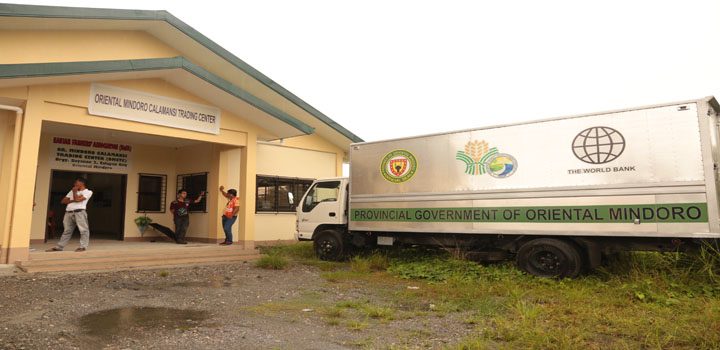 Reduced Spoilage. The Oriental Mindoro Calamansi Trading Center established under the Department of Agriculture's Philippine Rural Development Project (DA-PRDP) has saved much of the province’s calamansi harvest from rotting during the peak season when the local market has limited capacity to absorb the production volume. The trading center buys the local citrus fruit at stable prices even during the peak season when the price, usually determined by traders or middlemen, is at its lowest. (Photo by Kathrino V. Resurreccion, DA-PRDP NPCO InfoACE Unit)
Reduced Spoilage. The Oriental Mindoro Calamansi Trading Center established under the Department of Agriculture's Philippine Rural Development Project (DA-PRDP) has saved much of the province’s calamansi harvest from rotting during the peak season when the local market has limited capacity to absorb the production volume. The trading center buys the local citrus fruit at stable prices even during the peak season when the price, usually determined by traders or middlemen, is at its lowest. (Photo by Kathrino V. Resurreccion, DA-PRDP NPCO InfoACE Unit) DA project resolves calamansi spoilage in OrMin
A subproject of the Department of Agriculture’s Philippine Rural Development Project (DA-PRDP) has resolved the perennial problem on the peak-season spoilage of calamansi in Oriental Mindoro, resulting in improved income for the province’s calamansi farmers.
From July to November, when calamansi production is at its height, many farmers would normally opt to let their harvests rot.
They claim that this has become the usual practice as the prevailing market price during the peak harvest season could not even cover either the labor cost for fruit pickers, or transportation cost.
According to Rogelio Balba, a member of the project proponent Naujan Farmers Association (NaFa), the Oriental Mindoro Calamansi Trading Center established under the PRDP’s Enterprise Development (I-REAP) Component has stabilized the price of calamansi even during the peak production months.
“The center buys our produce at P8.00 to 12.00 a kilo[gram],” Balba claimed.
A resident of Guiba, Calapan City, Balba said that the PRDP’s subproject greatly enhanced their income in times when calamansi prices in Manila drop, forcing many farmers to just let their produce go to waste.
“For many years, calamansi farmers would already feel happy even with the narrowest margin of profit during the peak season,” he added.
Results of the Rapid Appraisal of Emerging Benefits (RAEB) activity conducted by the PRDP’s Monitoring and Evaluation Unit however show that with the the trading center, the spoilage rate has decreased by 48%.
Spoilage is a common problem of calamansi farmers during peak season when abundant harvest of the local citrus starts to come in. The unusually huge volume of produce is too much for the local market to absorb; hence, the price of the crop sharply drops.
The center can buy huge volumes of calamansi fruits from its farmer-members even during peak season as it supplies local food manufacturers that process calamansi juice all year round.
Balba also said that the delivery trucks, which also form part of the PRDP I-REAP subproject package, has eliminated the need for the farmers to rent transport vehicles, increasing their profit further.
In a focus group discussion conducted during the recent RAEB activity, farmers shared the same stories of calamansi being wasted during peak season because of loss-making markdown.
Balba, who owns a two-hectare farmland planted with calamansi, stressed that he personally picks his calamansi when the price is good, particularly during lean months. But the farmer also allows traders to do the harvesting during the peak season for as low as P6,000.00 per hectare.
On the average, a one-hectare land fully planted with matured calamansi trees could generate in one fruiting season 35 bushels (kaing), averaging 50 kilograms each. Based on this production, and assuming that the trading center would buy the fruits at P10 a kilogram, the farmer would earn some P17,500.
This center’s buying price is almost 200 percent higher than what some traders offer. Worse, the produce would just rot if not sold at all.
Aside from the trading center and two delivery trucks, the PRPD subproject includes fertilizer inputs for the existing trees of calamansi farmer-members.
Other emerging outcomes identified during the RAEB activity include increase in production area (16%), increase in farmgate price (27%), increase in production volume (5%), increase in marketed volume (14%) and increase in income (115%). ### (Alladin S. Diega, DA-PRDP NPCO InfoACE Unit)
